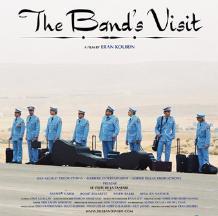Sometimes a comedy can break your heart. "The Band's Visit," a highly acclaimed Israeli movie now showing around the world, tells the story of a charming group of Egyptian musicians, the Alexandria Ceremonial Police Orchestra, who come to Israel to play at the opening of an Arab Cultural Center. A series of misunderstandings leaves the musicians -- resplendent in their sky-blue uniforms -- stranded in a tiny Israeli desert village. It is a sweet comedy of coexistence and shared humanity. The Israelis bring the Egyptians, dignified in their plight, into their homes. They get to know each other at the most basic, flawed, human level. Watching it, you feel your heart warming for a moment, then you realize this is fiction: another in a long line of Israeli fantasies of normalcy, of peace between Arabs and Israelis.
However unrequited, efforts to bring to life even a vision of peace are crucial. That's why some of the most passionate advocates of peace are working to create what they call a "culture of peace" between Israelis and Palestinians. The idea even made its way into the Annapolis peace conference, whose final document commits the sides to end the bloodshed and suffering, create a new era of security, justice and dignity, and "propagate a culture of peace."
The contrast to reality could not be any sharper. After an Arab man from East Jerusalem killed eight young Israeli students in a religious seminary earlier this month, he was hailed as a hero. It did not come as a surprise that extremists, who call for Israel's destruction, cheered for the murderer. But even the so-called moderates couldn't wipe a smile off their faces. The official newspaper of Fatah celebrated the "martyr" who committed the assault.

